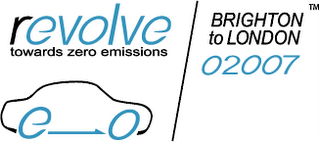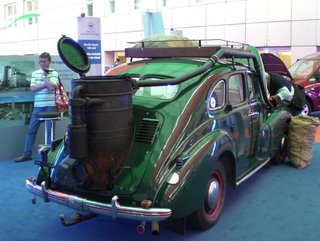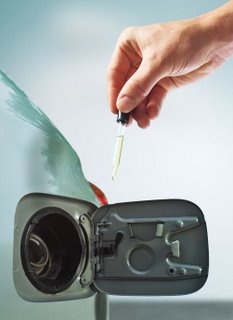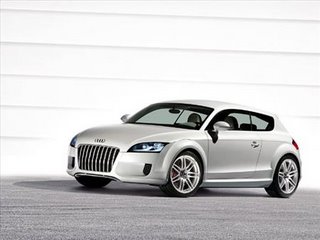20/11/2006
14/11/2006
Revolve event logo - what's your view?

Here at revolve we're having a debate about the logo for the 2007 event. The issue is the extra zero. Please let us know your opinion by posting a comment below.
P.S. For more about the thinking behind the extra zero, click here.
North Americans will travel less highway miles in 2010 than in 2005... Agree / Disagree?
In 2005, Mr Simon predicted that the peak oil phenomomenon will result in a drastic reduction in the wasteful and inefficient use of personal motor vehicles in the US out of economic necessity.
"I am predicting that vehicle use will decline rather than grow in the next 5 years to bring attention to the imminence of the crisis."
If he wins, he'll donate the proceeds to The Post Carbon Institute.
On the other hand, Mr Raphael pointed to the short-term option of producing liquid fuels from shale and coal.
"In the long run we've got the option of making more efficient cars and/or substituting batteries and fuel cells that are recharged with power provided by gas, coal, solar, hydro, and nuclear power plants. Five years is too short to expect much change in this area - we may not even have peaked by then. But once we do peak, it won't be much of a problem."
If he wins, he'll donate the proceeds to The Property and Environment Research Center.
Vote/discuss or make your own prediction here.
Labels: cars, fuel cells, hydrogen
12/10/2006
New Hydrogen Centre; Sees 6 Million Hydrogen Cars in Europe by 2020
"In cooperation with specialists in the field, we are advancing the development of several methods for biomass conversion into hydrogen. We are confident that soon all the hydrogen required by the Linde Hydrogen Center can be produced by sustainable production methods"
- Dr Aldo Belloni, member of the Executive Board of Linde AG.
"It would be a shame if Germany were to sleep through a trend in hydrogen technology the way we slept through hybrids.”
- Prof. Dr.-Ing. Wolfgang Reitzle, CEO of the Linde Group.
This sounds like positive news... and has sparked an entertaining hydrogen vs biofuels debate over at Green Car Congress. Check it out.
Labels: cars, hydrogen, re-fuelling
09/10/2006
We like CUTE buses!

Following on from the success of the major EU-assisted project: CUTE (Clean Urban Transport for Europe), six cities and regions in Europe and Canada are joining forces to buy more hydrogen-powered buses. Thus accelerating economies of scale. Since mid-2003, 27 public transport buses have covered more than 1 million km and carried more than 4 million people in 9 European cities as part of the CUTE project.
The cooperating cities and regions in the new alliance are: Amsterdam, Barcelona, Berlin, British Columbia Province, Hamburg and London. The Mayor of London plans to introduce 70 new hydrogen vehicles to London by 2010.
Labels: fuel cells, hydrogen, public-transport
22/09/2006
Global Warming is a Myth?
Well done to ExxonMobil for no longer funding the CEI!
However, Bob Ward of The Royal Society - Britain's premier scientific academy - has written to the Director of Corporate Affairs at Esso UK, accusing ExxonMobil of continuing to communicate an "inaccurate and misleading impression of the evidence of climate change". Added to this, the Royal Society points out that in 2005, ExxonMobil donated a total US$2.9million to a further 39 organisations that have also "misrepresented the science of climate change".
Read the letter in full here (592kb PDF)
This claim is based on a piece of public information literature entitled "ExxonMobil 2005 The Worldwide Giving Report" which apparently only lists US organisations(?), the Royal Society is wondering how many other organisations are benefitting from this kind of 'greenwash' funding.
At least two of the organisations have links to the UK. The International Policy Networkis a thinktank with HQ in London. In 2005, their Executive Director wrote a letter to the Daily Telegraph entitled "Greenhouse gassing" in which she argued: "...the cost of taking action now is likely to be far higher than if action is delayed. Current technologies for reducing emissions are expensive. Their rapid implementation would divert resources from more important activities."
In 2004, a US institute jointly published a report with the UK group the Scientific Alliance which claimed that global temperature rises were not related to rising carbon dioxide levels in the atmosphere.
"There is not a robust scientific basis for drawing definitive and objective conclusions about the effect of human influence on future climate," it said.
Bob Ward concludes his letter to Esso UK as follows: "...I have shared the contents of your documents with some climate researchers who are Fellows of the Royal Society and it would be useful to update them about whether ExxonMobil will be continuing to express views that are inconsistent with the findings of their work."
Labels: campaigns, CO2-emissions, global-warming
Biofuels: An Ecological Risk?
"Most of the traits that are touted as great for biofuel crops—no known pests or diseases, rapid growth, high water-use efficiency—are red flags for invasion biologists. We want to start a dialogue and approach the question of biofuels systematically."
—Robert N. Wiedenmann (A researcher at University of Arkansas)
Mr Wiedenmann and his colleagues have published a study warning of the potential for biofuel crops to cause both ecological and economic harm. They are chosen for their ability to grow very quickly but such plants are becoming weeds with the potential to invade neighbouring crop fields (i.e. cotton and soybean).
The study calls for ecological specialists to be included when planning new biofuel projects. You'd think that would already be the case, but obviously not.
Labels: bio-fuels
21/09/2006
Richard Hammond, LPG and Jet-Cars

Top Gear presenter Richard Hammond has had a serious accident whilst attempting to break the UK land-speed record in a jet-powered dragster.
Former Top Gear presenter, Steve Berry said of the accident: "He is incredibly lucky to be alive ... this isn't a car, it's more like a wingless aeroplane". The machine is capable of accelerating from 0-270 mph in just 6 seconds and was travelling at +/-300mph when it suddenly veered off the track and somersaulted.
The 'Programme Prevention Department'
Ironically one of Hammond's co-presenters, Jeremy Clarkson, has regularly been outspoken about his dislike of 'Health & Safety', calling it "the cancer of a civilised society" (Sunday Times article). The HSE is currently investigating Richard Hammond's accident. Interestingly, the crash was discussed on BBC's Question Time after someone asked the question: "has reality TV gone too far?" Watch the podcast here.
"He has brought an awful lot to [Top Gear] and his indefatigable energy, the fact that he tries absolutely anything once, may have been the reason that he has overstepped the mark a bit."
- Quentin Wilson talking to the BBC
Out of respect for his family's wishes, all we know is that Hammond sustained a significant brain injury, but doctors are "reasonably optimistic that he'll make a good recovery."
Whilst the Vampire jet car consumes 7-10 gallons of fuel per mile, Richard Hammond's family car is an eleven-year-old Range Rover Vogue SE with a thirsty 3.9-litre V8 engine. Luckily (and somewhat surprisingly given his co-presenter's environmentally unfriendly stance, Hammond's Range Rover is actually LPG-powered!. We wish him a speedy recovery.
Labels: cars, celebrity, fuel-efficiency, motorsport
Wood + Charcoal-Powered Car

Seen at Automechanika Frankfurt 2006, was this biomass “blast from the past”. A 3.5l V6 1938 Opel Kapitän which ran on wood and charcoal almost seventy years ago.
According to greencarcongress.com, "Charcoal burning conversion kits, which are really wood gas generators, enjoyed a brief civilian and military niche market in England, Germany, Australia, the United States, and other countries up to and during World War II. Wood gas generators were used to power taxis in Korea as late as 1970."
Fuel economy: 100 km / 38 kg of charcoal. The exhibitors, Alternative Kraftstoffe und Hybridantreibe didn't mention the CO2 emissions data.
Labels: bio-fuels, CO2-emissions
19/09/2006
Tyndall report outlines UK route to reduced carbon emissions
A new report by Friends of the Earth and The Co-operative Bank (based on research carried out by The Tyndall Centre for Climate Change Research) is the UK’s first comprehensive route-map to a low carbon economy.
The study shows the total amount of carbon dioxide the UK can emit between now and 2050.
The report describes how:
- Sufficient emissions reductions can be made by using technologies which are – or are close to - market ready.
- The UK needs to achieve significant emission cuts – of around 70 per cent - within the next 30 years and it is possible to do so.
By 2050 the research envisages a world where:
- People fill up their cars at multi fuel stations which provide a choice of electricity, biofuels or hydrogen
- Hydrogen fuel cells are routinely used to provide heat and power in homes
You can download a PDF summary here (1.4Mb) or the full report here (2.8Mb)
Labels: CO2-emissions, EV, fuel cells, hydrogen, off-grid, re-fuelling
Why Not One Hundred MPG?

As read in Popular Mechanics:
"...It became fashionable to drive SUVs because they projected an image of power and an active lifestyle. It's possible to imagine drivers being drawn to the environmental and national security benefits of efficiency--and to the cutting-edge engineering, as well.
So perhaps people have been asking the wrong question all along. It's not, "Why can't they build a 100-mpg car?" but rather, "Do we really want one?”
Labels: fuel-efficiency
18/09/2006
GM Plans to Sell Fuel-Cell Vehicles by 2010
The Daily Auto Insider Monday, September 18, 2006
General Motors intends to spend heavily over the next few years to develop hydrogen-powered fuel-cell vehicles for sale by 2010, The Wall Street Journal reported, citing GM executives.
GM plans to begin selling a thousand or more fuel-cell vehicles by 2010 and perhaps hundreds of thousands a year by 2015, the story said. Fuel-cell vehicles use a chemical reaction to convert hydrogen gas into electricity that powers an electric motor.
GM Vice Chairman Robert Lutz told the WSJ that GM almost certainly won't make money on its early fuel-cell vehicles but he said being in front on the new technology would help turn around consumers' view of the company.
Leading on fuel cells “can be a game-changer for GM," Lutz said.
Labels: fuel cells, GM
17/09/2006
Small is Beautiful

It's not just UK motorists who are feeling the petroleum-pinch. Automotive News reports that US imports are now out-selling domestic brands for the first time. The most popular imports include manufacturers of small, fuel-efficient cars like Toyota, Suzuki and Volkswagen. In Australia, local V6 muscle-cars are also being outsold by more economical four-cylinder imports for the first time. South Africans meanwhile, have just seen the price of petrol at their local pump rise for the sixth time this year. Of course, small cars don't necessarily have to be sensible... Car Magazine South Africa reports that Audi's next mini(rival)car will be based on their recent Shooting Brake concept (pic) and will be less expensive than their current A2.
Labels: cars, congestion, fuel-efficiency
Crop Rotation


Fiona Leggate is the highest placed female in British Touring Car Championship history. In 2005 she was voted by BTCC Fan's as their Rookie of the Year. Women are no longer seen as a novelty in motor-racing. What is more novel is Fiona's choice of fuel; her Vauxhall Astra Coupe has been converted to run on bio-ethanol. No offence to the other bio-ethanol teams (both racing MGs) but I'd rather see Fiona and her mean-green machine at revolve 2007!
Read more about mean, green racing machines.
Read more about Fiona's support for British farming.
Should America be fuelling its vehicles with corn-based E85?
Labels: bio-fuels, GM, motorsport






